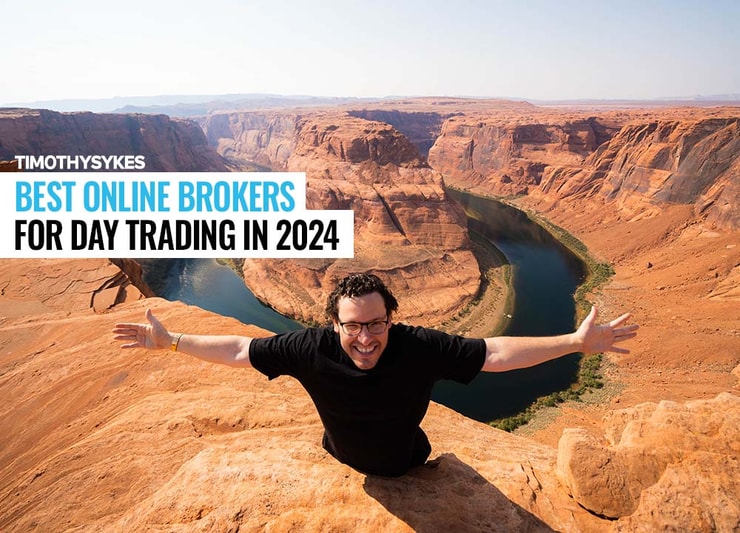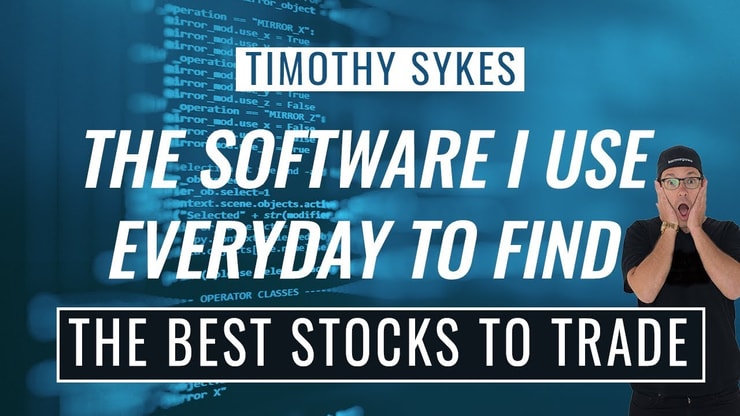In the dynamic world of day trading, the choice of a broker can significantly impact your trading success. With advancements in technology and increasing competition among brokers, 2024 offers a plethora of options for day traders. Each broker provides unique features, from advanced trading platforms to comprehensive educational resources, catering to the varied needs of traders. As a seasoned trader and educator, I have experienced firsthand the importance of selecting a broker that aligns with your trading style and goals.
You should read this article because it offers a comprehensive guide on choosing the best online brokers for day trading in 2024, tailored to enhance your trading success and efficiency.
I’ll answer the following questions:
- What are brokers?
- Why should you choose the right broker?
- What makes Interactive Brokers a top choice for serious day traders?
- How does the merger of TD Ameritrade and Charles Schwab benefit traders?
- What are the standout features of E-Trade for both novice and seasoned traders?
- What are the 5 factors to consider when choosing a broker?
- How do professional insights influence day trading?
- Why is understanding order routing critical for day traders?
Let’s get to the content!
Table of Contents
- 1 What Are Brokers?
- 2 Why Should You Choose the Right Broker?
- 3 Top Brokers for Day Trading
- 4 Additional Considerations for Day Traders
- 5 Key Takeaways
- 6 Frequently Asked Questions
- 6.1 Do Day Traders Pay Taxes?
- 6.2 Can You Start Day Trading with $500?
- 6.3 Is Day Trading Illegal?
- 6.4 What Financial Products Should Day Traders Consider?
- 6.5 How Important Are Retirement Accounts for Day Traders?
- 6.6 Which Online Broker Platforms Are Best for Day Trading?
- 6.7 What Trading Tools and Features Are Essential for Day Trading?
- 6.8 How Do Professional Insights Influence Day Trading?
- 6.9 What Are Key Business Considerations for Day Traders?
- 6.10 How Crucial Is Order Routing in Day Trading?
- 6.11 What Should Traders Look for in Trading Platform Software?
- 6.12 How Important Is User Experience in Choosing a Trading Platform?
- 6.13 How Do Credit Unions Compare to Banks for Day Traders?
- 6.14 Why Should Day Traders Consider Mortgage Rates and Lenders?
- 6.15 How Can Day Traders Manage Student Loans and Debt Consolidation?
- 6.16 Are Options Traders Affected by Contract and Order Sizes?
- 6.17 How Important Is Understanding Order Routing for Day Traders?
- 6.18 What Should Traders Look for in Trading Platform Features and Pricing?
- 6.19 How Do Platform Ability and Pricing Affect Day Trading?
- 6.20 Why Is Professional Advice Important in Selecting Trading Platforms?
- 6.21 How Can Day Traders Utilize Their Capital and Spot Opportunities?
- 6.22 What Role Do Market Rivals and Comparative Analysis Play in Day Trading?
- 6.23 How Do Mortgage Lenders and Pet Insurance Impact Day Traders?
- 6.24 How Can Day Traders Manage Losses and Understand Order Routing?
- 6.25 What Should Traders Consider in Trading Platform Pricing and Ability?
- 6.26 Why Are Company Websites and Pages Important for Day Trading Decisions?
What Are Brokers?

Brokers are the gatekeepers to the financial markets, providing platforms where traders and investors can buy and sell securities like stocks, bonds, options, and futures. They act as intermediaries, facilitating trade executions on behalf of their clients. In day trading, brokers are particularly vital, as they offer the tools, platforms, and support needed for the high-speed, high-volume trading that characterizes this style. Choosing a broker isn’t just about trading costs and commissions; it’s about finding a partner who can provide the right balance of technology, support, and access to a variety of markets and asset types.
Your broker is crucial, but mastering day trading as a whole is the key to success. Day trading is not just about executing trades; it’s about understanding market patterns, managing risks, and making informed decisions. Whether you’re a beginner or an experienced trader, there’s always room to learn and improve. To help you on this journey, I’ve compiled a wealth of information and strategies in my guide to learning how to day trade. This resource is designed to help you navigate the complexities of day trading and develop a winning approach.
Why Should You Choose the Right Broker?
Selecting the right broker is a critical decision for any day trader. The right broker not only affects your trading costs and profits but also impacts your trading experience and efficiency. A good broker provides a robust trading platform with advanced charting tools, quick order execution, and reliable customer support. Additionally, aspects like educational resources, market research, and risk management tools play a significant role in enhancing a trader’s ability to make informed decisions. As someone who’s navigated the evolving landscape of day trading, I can attest that the right broker can be a catalyst for success.
Top Brokers for Day Trading
Selecting the right broker is a pivotal decision for any day trader. Throughout my years of trading and teaching, I have always emphasized the importance of aligning with a broker that suits your individual trading style and needs. The top brokers in the market offer a range of accounts, from savings to checking accounts, and even specialized trading accounts. They cater to various trading preferences, whether it’s stock trading, options trades, or exploring the realms of cryptocurrency and ETFs. Each broker comes with its unique set of tools, services, and pricing structures, making it essential to evaluate them based on factors like trading platform capabilities, order executions, and price improvement opportunities.
Equally crucial is the trading platform you choose. A platform that aligns with your trading style can significantly enhance your efficiency and success. It should offer fast execution, real-time data, and tools for technical analysis. Remember, the right platform can make or break your trading strategy. For a deeper dive into selecting the ideal trading platform for day traders, check out my comprehensive guide on choosing the best trading platform for day traders.
Interactive Brokers
Interactive Brokers has consistently been a top choice for serious day traders. Known for its sophisticated desktop platform, Interactive Brokers caters to traders looking for depth in trading software and functionality. They offer a wide range of order types and routing options, which is crucial for managing price volatility and achieving price improvement. My experience with their platform has shown that they are well-suited for traders who demand a high level of control over their trades and are keen on trading a variety of assets, from equities to cryptocurrencies and ETFs. Additionally, their competitive margin rates are a significant advantage for traders employing leverage in their strategies.
Pricing and Fees
Interactive Brokers is known for its competitive pricing and fee structure, which is especially beneficial for active day traders. They offer low per-share pricing, with volume discounts available, which can be a game-changer for traders dealing with large volumes.
Trading Platforms and Tools
Interactive Brokers provides a sophisticated trading platform, catering to the needs of advanced traders. Their platform includes comprehensive charting tools, scanners, and a range of indicators, facilitating thorough market analysis and informed trading decisions.
Market Access and Securities
One of the standout features of Interactive Brokers is its extensive market access. Traders have the opportunity to trade a wide array of securities across global markets, which is invaluable for those looking to diversify their trading strategies.
TD Ameritrade / Charles Schwab

TD Ameritrade, now fully merged with Charles Schwab, brings together the best of both worlds. The renowned thinkorswim platform, known for its advanced charting and trading tools, is now available to a broader range of users, including those absorbed from TD Ameritrade into Schwab. Having guided many beginners through their trading journey, I’ve often recommended thinkorswim for its user-friendly interface combined with sophisticated analysis tools. This merger marks a significant shift in the trading landscape, offering a unified platform for Charles Schwab users, enhancing the trading experience with a wider variety of tools and resources.
Thinkorswim Trading Platform
The thinkorswim platform is renowned for its powerful trading tools and analytics. It offers customizable charting, a range of technical indicators, and sophisticated options trading capabilities, making it a top choice for serious day traders.
Educational Resources
Charles Schwab stands out for its commitment to trader education. They offer a wealth of resources, including webinars, courses, and articles, catering to both beginners and experienced traders looking to expand their knowledge.
Customer Support
Excellent customer support is crucial for day traders, and Charles Schwab excels in this area. Their responsive and knowledgeable team ensures that traders can get quick assistance with any issues or queries, enhancing the overall trading experience.
More Breaking News
- Potential Securities Fraud Looms Over BigBear.ai Amid Revenue Decline
- Transocean’s Stock Soars Amid Valaris Acquisition
- Diodes Surges with Strong Quarterly Results and New Product Launches
- Legal Probe Raises Concerns for NuScale Power Corp
E-Trade
E-Trade stands out as a broker that balances accessibility with advanced functionality, making it a solid choice for both novice and seasoned traders. In my experience, E-Trade excels in providing a trading environment that supports a range of trading activities, from stock trading to more complex options trades. Their platform offers advanced charting and analytical tools, essential for making informed trading decisions. E-Trade also understands the importance of educational resources, providing a wealth of information to help traders develop their skills and strategies. Furthermore, their commitment to providing quality customer service ensures that traders have the support they need, whether they’re dealing with complex order types or seeking advice on investment firms and wealth management. With a focus on offering a comprehensive trading experience, E-Trade is a reliable choice for day traders looking for a broker that supports their growth and adapts to their evolving needs.
User-Friendly Interface
E-Trade offers a user-friendly interface that is particularly appealing for beginners. Their platform is intuitive and easy to navigate, making it simpler for new traders to get started with day trading.
Advanced Charting Tools
E-Trade provides advanced charting tools that allow traders to analyze market trends and make informed decisions. These tools are essential for developing effective trading strategies.
Research and Data
Access to quality research and data is critical for successful trading. E-Trade offers comprehensive research resources, including market news, analysis, and data, helping traders stay informed about market movements and opportunities.
5 Factors to Consider When Choosing a Broker

Choosing the right broker is a pivotal decision for any day trader, akin to selecting a business partner. Throughout my trading and teaching career, I’ve emphasized the importance of aligning your broker choice with your trading goals. First, consider the broker’s account types, such as savings accounts, checking accounts, and credit options, ensuring they align with your financial needs. Next, evaluate the trading platform’s features and functionality, like order routing capabilities, charting tools, and desktop platform performance. A broker’s access to diverse markets, including stocks, options, cryptocurrencies, and ETFs, is also crucial for broadening your trading horizons. Additionally, consider the broker’s pricing structure and fees, which should align with your trading volume and strategy, whether it involves frequent day trades or occasional options trades. Lastly, assess the broker’s educational resources and customer support, which are invaluable, especially for pattern day traders and those new to the field.
Let’s break it down:
Commission Fees and Pricing Structure
Understanding a broker’s commission fees and pricing structure is essential. Look for transparency in fees and consider how the pricing aligns with your trading volume and style.
Platform Usability and Features
The trading platform’s usability and features should match your trading needs. Whether you need advanced charting capabilities or a simple, intuitive interface, ensure the platform supports your trading activities effectively.
Research Tools and Educational Resources
For continuous development and informed trading decisions, choose a broker that offers robust research tools and educational resources. This is particularly crucial for beginners who are still learning the intricacies of day trading.
Customer Service and Support
Reliable customer service and support can greatly enhance your trading experience. Ensure your broker provides prompt and helpful support, especially during critical trading moments.
Regulatory Compliance and Security
Your broker should adhere to regulatory standards and offer secure trading environments. This ensures your investments are protected and the broker operates with integrity and transparency.
Additional Considerations for Day Traders
For day traders, there are specific considerations that can significantly impact trading efficiency and profitability. Based on my experience in trading and educating new traders, I recommend paying close attention to the margin rates offered by brokers, as this can affect your ability to leverage trades. Another critical aspect is the range of order types available and the efficiency of order executions, which can be the difference between profit and loss in a volatile market. Additionally, the ability to engage in paper trading can be a valuable tool for testing strategies without financial risk. Day traders should also review the broker’s capabilities in terms of trading events and reports, as real-time information is key in fast-paced trading scenarios. Finally, for those interested in diversification, it’s important to check if the broker offers access to international exchanges and a variety of assets like equities, forex, and cryptocurrencies. The right broker should not only fit your current trading style but also support your growth and adaptation as a trader.
Understanding the basics of the trade is as important as other considerations. Day trading is a strategy that requires discipline, quick decision-making, and an understanding of market trends. To excel in day trading, you need to grasp its fundamentals and develop effective strategies. If you’re looking to get started or refine your approach, explore my advice on day trading basics, where I cover everything from basic concepts to advanced techniques.
Margin Requirements and Leverage
Understand the broker’s margin requirements and leverage options. These can impact your trading strategy, especially if you engage in margin trading or short selling.
Risk Management Tools
Effective risk management is crucial in day trading. Ensure your broker provides tools that help manage and mitigate risk, such as stop-loss orders and real-time alerts.
Access to International Markets
For traders looking to diversify, access to international markets can be a significant advantage. Check if your broker offers global market access and the ability to trade in different asset classes.
Key Takeaways
- Choosing the right broker is crucial for your success in day trading.
- Consider factors like pricing, platform features, research tools, and customer support.
- Evaluate each broker’s specific offerings to find the best fit for your trading needs.
Trading isn’t rocket science. It’s a skill you build and work on like any other. Trading has changed my life, and I think this way of life should be open to more people…
I’ve built my Trading Challenge to pass on the things I had to learn for myself. It’s the kind of community that I wish I had when I was starting out.
We don’t accept everyone. If you’re up for the challenge — I want to hear from you.
Apply to the Trading Challenge here.
Trading is a battlefield. The more knowledge you have, the better prepared you’ll be.
Which broker do YOU use? Let me know in the comments — I love hearing from my readers!
Frequently Asked Questions
Do Day Traders Pay Taxes?
Yes, day traders are subject to taxes on their trading profits. It’s important to understand the tax implications and regulations pertaining to trading income.
Can You Start Day Trading with $500?
While it’s possible to start day trading with a small amount like $500, it’s important to be realistic about the potential returns and risks. Starting with a small amount requires careful risk management.
Is Day Trading Illegal?
No, day trading is not illegal. However, it is regulated, and traders must adhere to rules set by regulatory bodies, such as the pattern day trader rule and margin requirements.
What Financial Products Should Day Traders Consider?
Day traders should be aware of the various financial products available to them, including credit cards and student credit cards for easy access to funds. Understanding one’s credit score is crucial for securing credit. Also, traders can consider using business checking accounts for their trading activities and explore options like auto insurance and home insurance for their personal assets.
How Important Are Retirement Accounts for Day Traders?
For day traders, investing in retirement accounts like an IRA, Roth IRA, or 401(k) can be part of a diversified investment strategy. Additionally, understanding ESG (Environmental, Social, and Governance) criteria and focusing on equity investments can complement their active trading strategies.
Which Online Broker Platforms Are Best for Day Trading?
Choosing the right online broker platform is essential for day trading. Platforms like TradeStation, Robinhood, Tastyworks, Webull, Merrill Edge, and Firstrade offer various tools and features tailored to the needs of day traders. Each platform has unique aspects, so reviewing and comparing them is crucial.
What Trading Tools and Features Are Essential for Day Trading?
Essential trading tools for day traders include advanced charts, customizable watchlists, and reliable trading apps. Access to comprehensive trading reports, expert reviews, and recommendations can significantly enhance trading decisions.
How Do Professional Insights Influence Day Trading?
Day traders should consider professional insights from experts, including evaluations, criteria, and ratings of trading platforms and strategies. These insights can offer valuable opinions that help shape trading approaches and strategies.
What Are Key Business Considerations for Day Traders?
Day traders running a small business should focus on aspects like effective business decisions, efficient business services, aligning with the right business partners, and setting clear business goals. Utilizing the expertise of business advisors can also be beneficial.
How Crucial Is Order Routing in Day Trading?
Order routing is a critical aspect of day trading, affecting the speed and price of trade execution. Traders should understand the different order routing methods, functionality, depth, capabilities, and considerations to optimize their trading performance.
What Should Traders Look for in Trading Platform Software?
When selecting trading platform software, traders should evaluate features, pricing, and the overall ability of the platform to meet their needs. Platform functionality and pricing are also important factors to consider, ensuring the platform aligns with their trading style and budget.
How Important Is User Experience in Choosing a Trading Platform?
User experience is vital when choosing a trading platform. Traders should consider the learning curve associated with each platform, the accuracy and selection of tools available, and the ease of making payments. Regular testing and comparing platforms can help in finding the most suitable one for individual trading needs.
How Do Credit Unions Compare to Banks for Day Traders?
For day traders, choosing between credit unions and banks depends on their specific needs. Credit unions often offer more personalized service and potentially better rates on loans, while banks might provide more comprehensive services and higher levels of convenience for trading-related activities.
Why Should Day Traders Consider Mortgage Rates and Lenders?
Day traders should be aware of mortgage rates and lenders as they can impact personal financial stability. Understanding these aspects is crucial, especially for those who trade full-time and rely on trading income to meet mortgage obligations.
How Can Day Traders Manage Student Loans and Debt Consolidation?
Managing student loans and debt consolidation is important for day traders. Effectively consolidating debt can free up more capital for trading, while poorly managed student loans can become a significant financial burden, affecting trading decisions.
Are Options Traders Affected by Contract and Order Sizes?
Options traders are significantly affected by contract and order sizes. Understanding these elements is vital to manage risks effectively, especially when dealing with large execution volumes and varying contract sizes.
How Important Is Understanding Order Routing for Day Traders?
Understanding order routing methods and functionality is critical for day traders. The depth, capabilities, and considerations of order routing can impact the speed and price at which trades are executed, directly affecting trading outcomes.
What Should Traders Look for in Trading Platform Features and Pricing?
Traders should evaluate trading platform features and pricing based on their specific needs. Key considerations include the platform’s ability to handle different trading sizes and prices, as well as the overall trading case and consideration of each platform.
How Do Platform Ability and Pricing Affect Day Trading?
Platform ability and pricing can significantly impact day trading efficiency and profitability. Traders should assess whether the platform’s functionality matches their trading style and whether the pricing structure aligns with their trading frequency and capital size.
Why Is Professional Advice Important in Selecting Trading Platforms?
Seeking professional advice can be crucial in selecting the right trading platform. Professionals can offer insights into the methodology, capabilities, and suitability of different platforms for various trading styles and objectives.
How Can Day Traders Utilize Their Capital and Spot Opportunities?
Effective capital utilization and spotting opportunities are key for day traders. They need to be adept at analyzing market trends, sales data, and compensation structures to identify potential trades and manage their capital efficiently.
What Role Do Market Rivals and Comparative Analysis Play in Day Trading?
Understanding market rivals and conducting comparative analysis are important for day traders. This involves evaluating different trading platforms, methodologies, and strategies to find the most effective approach. Keeping abreast of what competitors are doing can also provide valuable insights and help identify emerging trends.
How Do Mortgage Lenders and Pet Insurance Impact Day Traders?
Mortgage lenders play a crucial role in a day trader’s financial stability, especially for those who rely on trading as their primary income source. The terms offered by mortgage lenders can significantly affect their financial flexibility. Additionally, while seemingly unrelated, pet insurance can be part of a trader’s overall personal financial planning, ensuring unexpected personal expenses do not impact trading capital.
How Can Day Traders Manage Losses and Understand Order Routing?
Effective management of losses is essential for day traders. This involves not only setting clear trading sizes and considerations but also understanding the complexities of order routing functionality, depth, size, price, case, and consideration. These factors can significantly impact trade execution and, consequently, the profitability and sustainability of trading strategies.
What Should Traders Consider in Trading Platform Pricing and Ability?
When evaluating trading platforms, traders should consider both the pricing and the platform’s ability to meet their trading needs. Tastytrade, for instance, offers unique features suitable for some trading styles. It’s important to balance the cost of the platform with its functionality, ensuring it aligns with the trader’s overall trading consideration and size requirements.
Why Are Company Websites and Pages Important for Day Trading Decisions?
Company websites and business pages can be invaluable sources of information for day traders. They provide insights into company performance, industry trends, and significant events, which can all impact trading decisions. Additionally, reviewing the pros and cons of trading strategies and platforms elsewhere on reputable sites adds to a well-rounded understanding of the trading landscape, helping traders make informed decisions about everything related to their trading activities.





Leave a reply